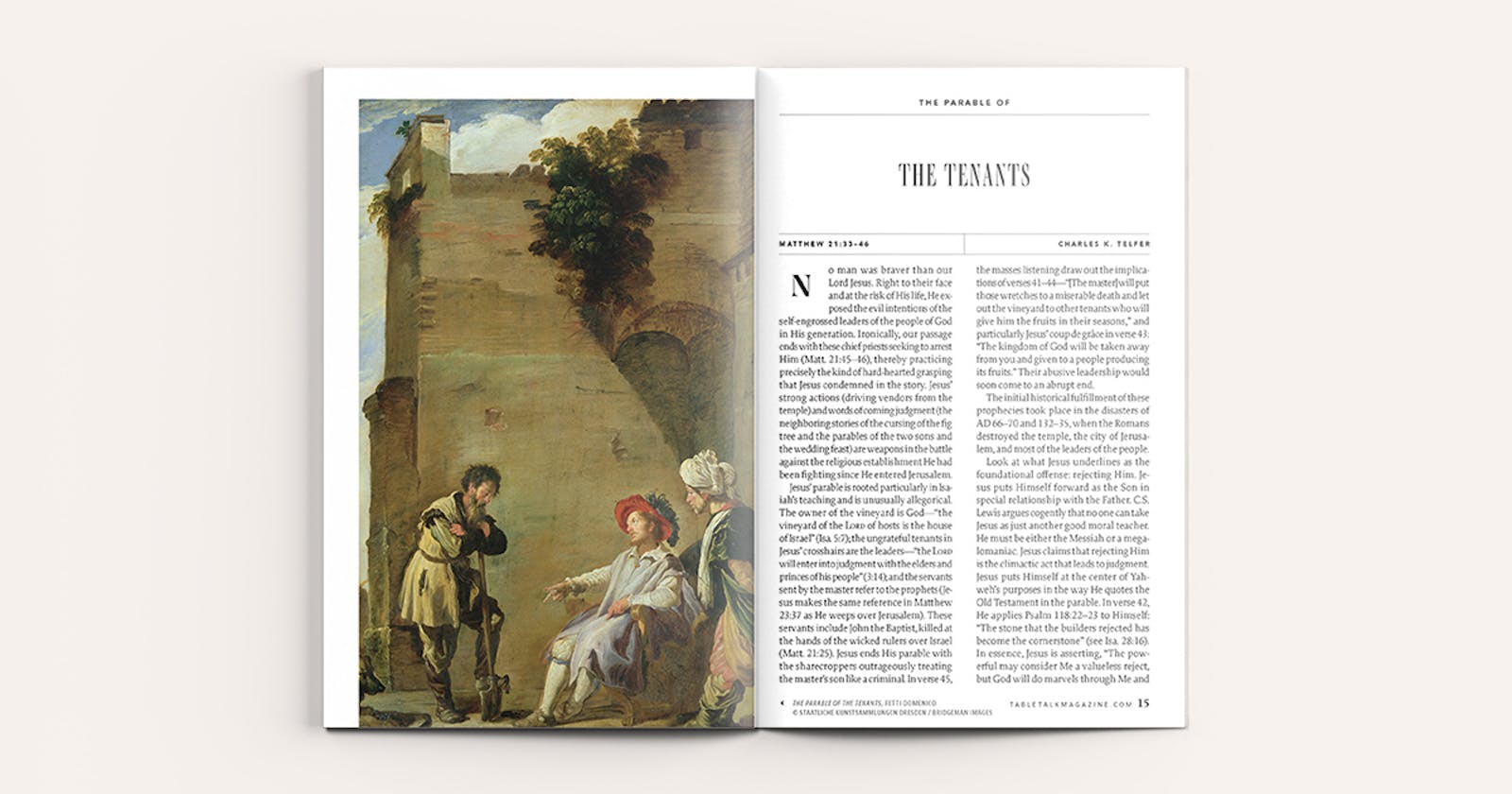
Request your free, three-month trial to Tabletalk magazine. You’ll receive the print issue monthly and gain immediate digital access to decades of archives. This trial is risk-free. No credit card required.
Try Tabletalk NowAlready receive Tabletalk magazine every month?
Verify your email address to gain unlimited access.
No man was braver than our Lord Jesus. Right to their face and at the risk of His life, He exposed the evil intentions of the self-engrossed leaders of the people of God in His generation. Ironically, our passage ends with these chief priests seeking to arrest Him (Matt. 21:45–46), thereby practicing precisely the kind of hard-hearted grasping that Jesus condemned in the story. Jesus’ strong actions (driving vendors from the temple) and words of coming judgment (the neighboring stories of the cursing of the fig tree and the parables of the two sons and the wedding feast) are weapons in the battle against the religious establishment He had been fighting since He entered Jerusalem.
Jesus’ parable is rooted particularly in Isaiah’s teaching and is unusually allegorical. The owner of the vineyard is God—“the vineyard of the LORD of hosts is the house of Israel” (Isa. 5:7); the ungrateful tenants in Jesus’ crosshairs are the leaders—“the LORD will enter into judgment with the elders and princes of his people” (3:14); and the servants sent by the master refer to the prophets (Jesus makes the same reference in Matthew 23:37 as He weeps over Jerusalem). These servants include John the Baptist, killed at the hands of the wicked rulers over Israel (Matt. 21:25). Jesus ends His parable with the sharecroppers outrageously treating the master’s son like a criminal. In verse 45, the masses listening draw out the implications of verses 41–44—“[The master] will put those wretches to a miserable death and let out the vineyard to other tenants who will give him the fruits in their seasons,” and particularly Jesus’ coup de grâce in verse 43: “The kingdom of God will be taken away from you and given to a people producing its fruits.” Their abusive leadership would soon come to an abrupt end.
The initial historical fulfillment of these prophecies took place in the disasters of AD 66–70 and 132–35, when the Romans destroyed the temple, the city of Jerusalem, and most of the leaders of the people.
Look at what Jesus underlines as the foundational offense: rejecting Him. Jesus puts Himself forward as the Son in special relationship with the Father. C.S. Lewis argues cogently that no one can take Jesus as just another good moral teacher. He must be either the Messiah or a megalomaniac. Jesus claims that rejecting Him is the climactic act that leads to judgment. Jesus puts Himself at the center of Yahweh’s purposes in the way He quotes the Old Testament in the parable. In verse 42, He applies Psalm 118:22–23 to Himself: “The stone that the builders rejected has become the cornerstone” (see Isa. 28:16). In essence, Jesus is asserting, “The powerful may consider Me a valueless reject, but God will do marvels through Me and give Me a kingdom.” More soberly still, in Matthew 21:44, Jesus presents Himself as the dangerous stone (Isa. 8:14; Dan. 2:34, 44). “Don’t brush Me aside!” He is saying.

This story strengthened early Christians’ faith against the shame and disgrace that Jesus was “thrown out and killed” (Matt. 21:39). Muslims reject the crucifixion of the prophet Jesus as inconceivable; indeed, His death is a scandal to all those who are looking for earthly displays of power and influence. Plus, how many people were converted by Jesus’ teaching here? Outward results are not a good measure of faithful preaching. Our passage helped early Jewish Christians make sense of the radical changes in the leadership and outward form of God’s people taking place in the first century (Acts 2:23–37; 3:14–15). And Jesus’ parable helps us all see the larger New Testament picture of an expanded Israel of God made up of both Jewish and gentile believers under the new leadership of Christ’s Apostles (Rom. 11; Gal. 6:16).
We who believe in Jesus must guard ourselves from the smugness and ingratitude He condemns here (see Rom. 11:21). The Master is coming, and we must render account. Let us be careful to produce the fruits of trust and just living that He expects. And let us keep in mind all of God’s abundant kindness to us suggested by this parable: the carefully prepared vineyard, the hyper-patient dealings of the landowner pleading for a response, and the Son who died. The brave man who spoke this parable was shortly on His way to “taste death for everyone” (Heb. 2:9). What a reason for us to respond in faith and gratitude today and every day.
